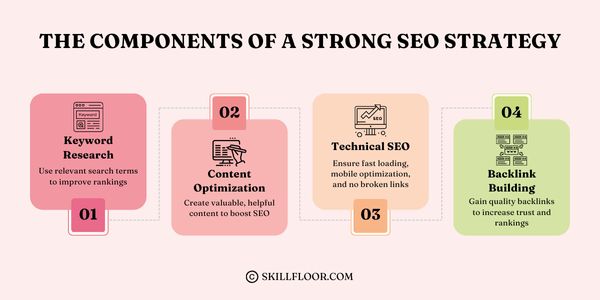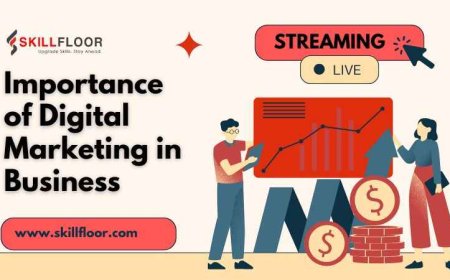10 Key Benefits of SEO for Your Business
Struggling to get noticed? These 10 SEO benefits can boost your business visibility and sales—don’t let your competitors take the lead!

As a digital marketing expert, I know how powerful the benefits of SEO can be for businesses. Here is a fact that 68% of people start their online journey with a search engine. That means most of your potential customers are searching for products or services like yours on Google or similar platforms. Organic search results get over 45% of all clicks. Even better, SEO can bring in more than 1,000% of the traffic that social media does! If you’re not using SEO, you’re missing out on a huge chance to grow your business.
Here, I will explain the 10 key benefits of SEO and how it can help your business succeed. SEO doesn’t just get more visitors to your website; it helps you reach the right people who are already interested in what you offer. Businesses with blogs, for example, get 97% more backlinks, which helps them rank higher in searches. SEO can save you money on ads, build trust with your audience, and make it easier for people to find you online. Let’s explore how SEO can make a big difference for your business and help it grow.
For more information refer to this site:
https://www.forbes.com/advisor/business/software/seo-statistics/
What is Search Engine Optimization (SEO)
SEO stands for Search Engine Optimization, which is the process of improving your website to make it more visible to search engines. When you optimize your site for SEO, search engines like Google, Bing, and Yahoo can better understand and rank your pages. The goal is to make sure your website appears higher up in search results for relevant queries.
There are three main types of SEO:
-
On-page SEO: This refers to everything you can do on your website to make it more search-engine friendly. This includes using the right keywords in your content, having good quality content, and making sure your site is easy to navigate.
-
Off-page SEO: This involves activities that happen outside your website, like getting other reputable websites to link back to your content (called backlinks). The more quality backlinks you have, the higher your website can rank.
-
Technical SEO: This focuses on the technical aspects of your website, such as ensuring it loads quickly, is mobile-friendly, and has a good structure that search engines can crawl and index easily.
Why Does SEO Matter for Businesses?
SEO is essential for businesses because it allows you to be found by people who are actively searching for what you offer. If your business isn’t showing up on search engines, you’re missing a huge opportunity to attract new customers.
Importance of SEO in digital marketing
-
Reach the right audience: SEO helps attract people who are looking for products or services that you provide. When your website ranks higher in search results, more people will see it.
-
Cost-effective marketing: SEO brings organic traffic to your website. Unlike paid advertising, you don’t have to pay for each click or visitor. The traffic you get from SEO continues over time without extra costs.
-
Increase visibility: The higher your website ranks, the more likely people are to trust and visit your site. Most users don’t go past the first page of search results, so appearing at the top gives you a significant advantage.
The Components of a Strong SEO Strategy
A successful SEO strategy is made up of several components that work together to improve your rankings. These include:

-
Keyword Research: Find the words and phrases people use when searching for your products or services. For example, if you sell shoes, “buy running shoes online” could be a valuable keyword. Using these keywords in your content will help your site rank for those terms.
-
Content Optimization: High-quality content that provides value to visitors is key. Content should answer people’s questions or solve their problems. Google values fresh, useful content, so creating blog posts, articles, or guides can help improve your rankings.
-
Technical SEO: This ensures your website is technically sound. It includes things like improving loading speed, making sure your site works well on mobile devices and fixing broken links.
-
Backlink Building: Backlinks are links from other websites to yours. These are like votes of confidence that your website is trustworthy. The more quality backlinks you have, the higher your website will rank.
How SEO Impacts Different Business Types
No matter what type of business you run, SEO can help you achieve your goals. However, SEO strategies may differ depending on the type of business:
-
Small Businesses: Local SEO is critical for small businesses. By optimizing for local searches like “plumber near me” or “best pizza in [city name],” small businesses can attract nearby customers who are ready to buy.
-
E-commerce: E-commerce businesses can benefit from SEO by driving traffic to product pages. By using product-specific keywords and improving product descriptions, you can increase the visibility of your store and boost sales.
-
Service-Based Businesses: For service-based businesses, such as lawyers, dentists, or contractors, SEO helps attract people in need of services in a particular location. Local SEO practices, like creating a Google My Business listing, are important for service providers.
10 Key Benefits of SEO
1. Increased Website Traffic
SEO plays a major role in bringing more visitors to your website. When your website ranks higher for relevant keywords on search engines like Google, people searching for those keywords are more likely to click on your link.
Why it’s important:
-
According to Research, the first result on Google has an average click-through rate (CTR) of 27.6%, while the second result has only 24.7%. This means that ranking higher can significantly increase the number of visitors to your site.
-
75% of people never scroll past the first page of search results. If your website isn’t on the first page, you're missing out on valuable traffic.
What it means for your business:
-
SEO helps you attract a large number of visitors at no extra cost.
-
Increased traffic brings more opportunities to convert those visitors into paying customers.
2. Improved Brand Visibility
When your website appears on the first page of search results, it gives your brand more visibility. The more visible you are, the more likely people are to click and learn about your business.
Why it’s important:
-
68% of online experiences begin with a search engine . This means most people find what they need through search engines, so if you’re visible on those platforms, they’ll discover your brand.
-
33% of all clicks on search results go to the first organic result, meaning the higher you rank, the more likely people are to click and visit your website.
What it means for your business:
-
More visibility leads to better brand recognition, helping customers remember and trust you.
-
Being on the first page establishes your business as an authority in your industry.
3. Cost-Effective Marketing
SEO is one of the most cost-effective ways to drive traffic to your website. While paid advertising requires a constant budget to maintain visibility, SEO brings organic traffic without the ongoing costs.
Why it’s important:
-
SEO is 53% more effective at generating leads than traditional outbound methods like cold-calling and print ads.
-
Compared to paid ads, SEO offers a much better return on investment (ROI). Businesses that invest in SEO can see a long-term flow of visitors with relatively low ongoing costs once they have optimized their site.
What it means for your business:
-
SEO helps businesses save money on paid advertising by driving free, organic traffic to their websites.
-
It provides a sustainable long-term solution that continues to deliver results without continuous spending.
4. Enhanced User Experience
SEO focuses not only on keywords but also on optimizing user experience (UX). A website that loads quickly is mobile-friendly, and is easy to navigate keeps visitors happy and engaged, which can help improve your rankings further.
Why it’s important:
-
Google’s algorithm ranks websites based on how well they provide a user-friendly experience. For example, websites with fast loading speeds and a mobile-friendly design are more likely to rank higher.
-
53% of mobile users leave a site if it takes more than 3 seconds to load.
What it means for your business:
-
An optimized website with a fast load time and mobile-friendly design enhances user experience, which increases engagement and decreases bounce rates.
-
Providing a seamless experience helps your business rank higher on search engines, attracting more visitors.
5. Higher Conversion Rates
SEO helps attract visitors who are already searching for your products or services. This means that these visitors are more likely to convert (buy your product, sign up for your newsletter, etc.) because they found exactly what they were looking for.
Why it’s important:
-
Organic search leads have a 14.6% close rate, compared to a 1.7% close rate for outbound leads (like cold calls or direct mail).
-
When visitors come to your website through a search engine, they’re actively looking for something you offer, so they’re more likely to make a purchase.
What it means for your business:
-
SEO brings targeted visitors to your site, which increases the chances that they will take action, whether that’s making a purchase or subscribing to your service.
-
Higher conversion rates mean more revenue and better business growth.
6. Builds Trust and Credibility
A higher ranking in search results builds trust with your audience. People tend to trust websites that appear at the top of search results because they believe search engines rank the most relevant and trustworthy sites higher.
Why it’s important:
-
Studies show that 77% of users ignore paid ads and focus on organic search results instead. People trust organic results more because they feel these are more relevant and credible.
-
Google’s ranking algorithm uses factors like backlinks, content quality, and user experience to assess a website’s credibility.
What it means for your business:
-
Ranking high in search results positions your brand as a trusted authority in your industry.
-
Building credibility through high rankings increases customer loyalty, increasing repeat business.
7. Competitive Advantage
SEO helps you stay ahead of competitors. If your competitors are not leveraging SEO properly, you can take advantage by ranking higher and attracting more customers. Even if they are, you can always refine your strategies to rank even higher.
Why it’s important:
-
93% of online experiences start with a search engine. If your competitors are ranking higher than you, you may lose out on valuable customers.
-
75% of searchers never scroll past the first page of results, meaning if your competitors are not ranking well, you can easily take the top spot by improving your SEO.
What it means for your business:
-
SEO gives you a competitive edge by helping you outrank your competitors and attract more customers.
-
By focusing on SEO, you ensure that your business remains visible and relevant in an increasingly crowded digital marketplace.
8. Targeted Local Traffic
For businesses that serve a specific location, local SEO is essential. Local SEO helps your website rank higher for geographically targeted searches, such as "best plumber in [your city]."
Why it’s important:
-
46% of all Google searches are seeking local information. This means people are looking for businesses near them, and local SEO can help you connect with those customers.
-
Optimizing your Google My Business listing and gathering reviews can significantly improve your local SEO ranking.
What it means for your business:
-
Local SEO brings in highly-targeted traffic, people who are ready to buy or use your services.
-
It increases foot traffic for physical stores, making it easier for people in your area to find you.
9. Long-Term Results
SEO is a long-term strategy. While it might take a few months to start seeing results, the benefits are lasting. Once your website ranks higher, you’ll continue receiving organic traffic without having to constantly pay for ads.
Why it’s important:
-
SEO provides long-lasting results, as websites that rank higher on Google will generally maintain their position with ongoing SEO work.
-
Unlike paid advertising, which stops generating traffic when you stop paying, SEO efforts keep delivering results even after you’ve optimized your site.
What it means for your business:
-
SEO is a long-term investment that continues to generate results without needing continuous spending on ads.
-
Once your rankings improve, you’ll continue receiving organic traffic, keeping your business growing.
10. Measurable Results and Insights
SEO allows you to track and measure your success using tools like Google Analytics. You can see exactly how much traffic you’re getting, what keywords are bringing visitors, and how well your website is converting those visitors into customers.
Why it’s important:
-
Google Analytics and other tools allow you to monitor your website’s performance, so you can see exactly how well your SEO efforts are working.
-
SEO data can show what is working and what needs improvement, allowing you to adjust your strategies to get better results.
What it means for your business:
-
You can track your progress and make data-driven decisions to continuously improve your website’s performance.
-
Measurable results help you justify your marketing budget and optimize your SEO strategy for better outcomes.
The Role of Analytics in SEO Success
Analytics are important tools for measuring the success of your SEO efforts. Using tools like Google Analytics, you can track important metrics like:
-
Traffic: This tells you how many people are visiting your website and where they are coming from.
-
Bounce Rate: This is the percentage of people who visit your website but leave without interacting with it. A high bounce rate might suggest that your website needs improvement in content or design.
-
Conversions: This tracks how many visitors take the desired action, such as making a purchase or filling out a contact form. Higher conversion rates mean your SEO strategy is bringing in the right audience and turning them into customers.
How SEO Aligns with Business Goals
SEO isn't just about ranking higher on search engines; it also directly supports your business goals.
-
Brand Awareness: SEO improves your visibility on search engines, which means more people will come to know about your brand. When your website ranks high for relevant searches, more people will see your business.
-
Lead Generation: SEO attracts visitors who are interested in what you’re offering. These visitors are more likely to become leads because they are actively searching for products or services like yours.
-
Sales Growth: SEO helps bring in targeted traffic. For example, if someone searches for “affordable laptops for students,” they are more likely to purchase from a website that ranks highly for that search term. By optimising your website for relevant keywords, SEO can help convert visitors into customers.
The Long-Term Value of SEO for Businesses
One of the greatest advantages of SEO is that it provides long-term benefits. Once your website ranks highly, it can continue to bring in traffic without needing constant updates or payments. Here’s why SEO is valuable in the long run:
-
Building Authority: As your website continues to rank higher and gain backlinks, it becomes more trusted by both users and search engines. This can help you maintain high rankings over time.
-
Organic Traffic: SEO delivers organic traffic, which means you don’t have to pay for every click or visit. This leads to a consistent stream of visitors without ongoing costs.
-
Reduced Dependence on Ads: Once your website ranks well, you don’t need to rely on paid ads to get visitors. This saves you money in the long term.
Common Challenges in SEO for Businesses
While SEO offers many benefits, there are some challenges businesses face. Here are a few common ones:
-
High Competition: Many businesses are trying to rank for the same keywords, which can make SEO more competitive. It takes time and consistent effort to stand out.
-
Keeping Up with Algorithm Changes: Search engines update their algorithms frequently. These changes can affect how websites are ranked, so it’s important to stay updated and adapt your SEO strategy accordingly.
-
Common Mistakes: Businesses sometimes make SEO mistakes like using too many keywords (keyword stuffing), not optimizing for mobile users, or creating poor quality content. These mistakes can hurt your rankings.
SEO is an essential tool for any business looking to grow and succeed in the digital world. By optimizing your website and content, SEO helps increase visibility, attract the right audience, and improve user experience, all of which lead to more website traffic, higher rankings on search engines, and better customer engagement. It’s a cost-effective strategy that provides long-term benefits by driving organic traffic and helping businesses stay competitive in their industry. Whether you're a small local business or a large e-commerce store, SEO supports key business goals such as increasing sales, generating leads, and building brand credibility. Investing in SEO not only brings immediate results but also ensures sustainable growth and success in the future.































































